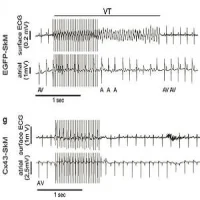The cardiac troponin blood test is the current gold standard test used for the clinical diagnosis of myocardial infarction (MI or death of heart muscle due to lack of blood supply), commonly known as a heart attack. A new blood test that measures the degree of proteolytic digestion improves on the current gold standard on heart attack diagnosis, according to a new study published in the Journal of Applied Laboratory Medicine.
The new test was developed by a University of Alberta physician, Peter Hwang, a clinician-scientist in the Faculty of Medicine & Dentistry. He says the current troponin blood test doesn't indicate the extent of cardiac damage. While the existing troponin test is still very useful, Dr. Hwang points out, the new test would enable clinicians to make objective decisions about treating patients when faced with less clear-cut situations.
Cardiac troponin is a protein unique to the heart and increased levels in the blood indicate that the heart has been damaged. Currently, doctors rely on clinical context when interpreting an elevated troponin level because it could just as easily be caused by running a marathon or fighting a life-threatening infection as it could by a heart attack, explains Dr. Hwang. "Sometimes the correct answer to the question – is it a heart injury or merely strain – isn't always obvious, even with all the clinical information," he adds.
The doctor further examined the changes related to the troponin release process. He found that patients with a true heart attack had more fragmented troponin than those with increased cardiac strain.
"We postulated that when cells die during a heart attack, not only would they release troponin into the bloodstream, but they would also digest the troponin through the action of activated intracellular proteases – enzymes that digest other proteins," he explains.
The study included 29 inpatients from the University of Alberta Hospital and Mazankowski Heart Institute with elevated troponin levels either with known heart attacks, or other conditions that increase cardiac demand.
"As predicted, we found that the degree of proteolytic digestion increased with increasing severity of heart injury," Dr. Wang said. "The highest degree was observed in patients with type 1 MI (the classic 'heart attack'), where you have an acute blockage of a coronary artery, while the least degree was found in patients with type 2 MI, where the heart is just working harder."
The doctor notes that further research is necessary before the new troponin blood test becomes the new standard in heart attack testing.
Source: University of Alberta Faculty of Medicine & Dentistry
Image Credit: Pixabay
Latest Articles
heart attack, troponin blood test, cardiac troponin blood test, cardiac strain
A new blood test developed by a University of Alberta physician eliminates guesswork clinicians face with an apparent heart attack and improves diagnosis.










